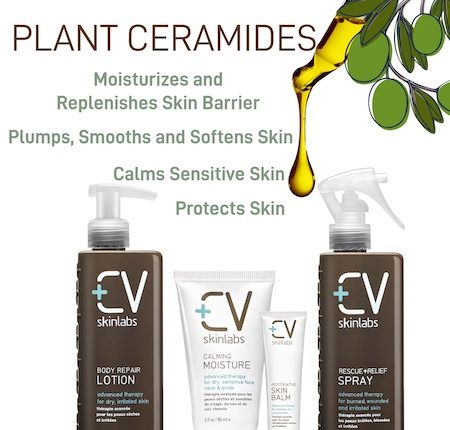You may have heard of ceramides in skin care solutions, but have you heard of plant ceramides?
These are the types of ceramides we use in our formulas here at CV Skinlabs. We prefer them because they are closer to nature and thus easier to absorb and use through the skin.
What are plant ceramides?
Let’s start with ceramides in general. They are lipids (another name for fats) that occur naturally in our skin. They make up about 50 percent of the lipids in the outer layer, so they play an important role in how your skin looks, feels and responds to external threats.
Although your skin naturally has its own ceramides, the amount can decrease with age, sun exposure and other factors. By replenishing them you can keep your skin smooth, soft and healthy.
What do ceramides do?
Ceramides have a number of important tasks in your skin.
Moisturizing
Ceramides help retain moisture. They have a water retention feature that keeps your skin soft and supple throughout the day. If you don’t have enough ceramides, you may experience a dry and dull appearance.
Protective
Ceramides also have a protective function. They can reduce harmful free radicals in the skin that would otherwise destroy collagen and elastin. They also serve as your body’s first line of defense against external pollution and toxins. You can think of them as the structures that come together to form the natural skin barrier.
Anti-aging
Ceramides are like the ‘glue’ in your skin that holds the other cells and structures together. This gives your skin the strength and support it needs to look its most youthful self. It also helps retain moisture while keeping harmful elements out.
Photo by George Milton via Pexels.
Signs your skin is lacking ceramides
Low ceramide levels in your skin are linked to several problems. If you notice any of the following, you may need more ceramides in your skin care products.
- More acne outbreaks
- Dryness and dullness
- Flares of eczema or psoriasis
- Redness and irritation
- Thin skin
What causes low levels of ceramides in the skin?
Several factors can contribute to low ceramide levels in the skin. They include the following:
- Sun exposure: The sun can gradually break down the structures in the skin, reducing the number of ceramides.
- Aging: As we age, skin can no longer replenish its natural ceramides as well as when it was younger.
- Products: Using harsh beauty products that affect the skin’s barrier function can damage ceramides and lead to dehydration.
- Eating pattern: Not getting enough supportive nutrients can rob your skin of the fatty acids it needs.
How do plant ceramides in skin care products help?
Ceramides are added to skin care products to replenish the natural products you have lost. Adding it to your daily skin care regimen offers several benefits.
Hydrate
Ceramides help hydrate your skin. As we get older, we need more and more moisture because the skin is naturally drier. If you notice that your regular moisturizer isn’t helping as much as it used to, it may be deficient in ceramides.
Replenish the skin barrier
The skin barrier is the outermost layer of the skin. It consists of dead cells, proteins, fats and lipids. About half of these are ceramides. Adding more to the mix will strengthen the outer barrier, protect your skin and lock in moisture.
Plump and smooth
When you apply products containing ceramides every day, you will notice that your skin looks plumper over time. These are the ceramides that keep moisture in, so that your skin looks soft and supple. They can also make fine lines and wrinkles look less noticeable.
Soothes sensitive skin
If you have sensitive skin, you should apply ceramides. They not only soothe, moisturize and protect, but also help soothe itchy, irritated skin. If you suffer from eczema or psoriasis, formulas containing ceramides can help soothe itching while keeping your skin healthy and hydrated.
People with eczema and psoriasis generally produce fewer ceramides naturally. Skin care products containing ceramides can help counteract the effects of these conditions on the skin.
Protects the skin
Ceramides help keep out harmful elements such as pollution, toxins and allergens. If you use them regularly, your skin will become stronger and more resilient. You may notice less irritation, redness and reactions.

What is the difference between synthetic and vegetable ceramides?
Like many ingredients in skin care products, they can come from a variety of sources. Some skin care manufacturers use synthetic ceramides, which are man-made. They are made in a laboratory by mixing certain ingredients. Some ceramides also come from animal sources.
The ones we use at CV Skinlabs are plant ceramides, or phytoceramides. ‘Phyto’ means plant, so the term describes those ceramides that come directly from plants.
Synthetic ceramides tend to be more common in the skin care products you find at the store, and they can help replenish the ceramides your skin is missing. However, phytoceramides are often preferred by clean beauty enthusiasts, due to their natural origin and because they are easier to absorb into the skin.
We can obtain plant ceramides from many different types of plants, including wheat, corn, soy, oats and rice. But many other ingredients also serve as a natural source of ceramides.
How do I know if my skin care product contains plant-based ceramides?
Look at the ingredients list of your skin care product. Typically, synthetic ceramides are listed as ceramides, although you may also see other letters accompanying the word, such as ceramide AP or ceramide EOP.
Ingredients like phytosphingosine and sphingosine are ceramide precursors, meaning they stimulate the skin to produce more of its own ceramides.
Ceramides can also be hidden in other ingredients, if they are a natural part of those ingredients. For example, natural oils are a rich source of ceramides and fatty acids. When you see ingredients like jojoba oil, safflower oil, and grapeseed oil, you can bet that these ingredients are largely made up of ceramides. Other good sources are sunflower oil and poppy seed oil.
By the way, here you will find the ceramides in our CV Skinlabs formulas. They are easily recognizable on the skin and are perfect for sensitive skin because they are so soft. Plus, all CV Skinlabs products are gluten-free!
Are you looking for plant-based ceramides in your skin care products?
Featured image by Ron Lach via Pexels.






